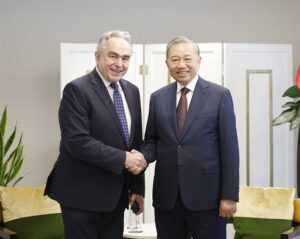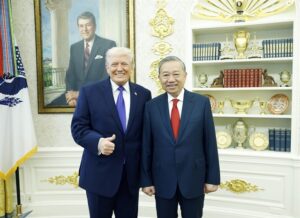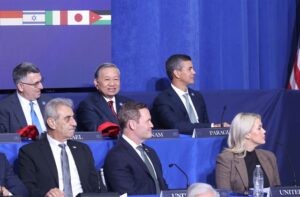PM Chính Stresses Strategic Approach to US Trade Negotiations Amid Tariff Pause

Hanoi, The Gulf Observer: Prime Minister Phạm Minh Chính has emphasized that upcoming trade negotiations with the United States—following former President Donald Trump’s recent announcement of a pause on higher tariffs against several trading partners, including Vietnam—must be addressed in a broader diplomatic and economic context, particularly within the comprehensive Vietnam–US relationship.
Chairing a high-level meeting on April 10 with standing cabinet members and leaders of ministries, sectors, and localities, the Prime Minister praised the proactive, timely, and effective responses of relevant Vietnamese agencies. He welcomed the United States’ agreement to begin formal trade negotiations, following a working session held on April 9 (US time) between Deputy Prime Minister Hồ Đức Phớc and U.S. Trade Representative Jamieson Greer.
PM Chính directed the establishment of a dedicated negotiating team led by the Minister of Industry and Trade, to be operational by Friday. The team will be tasked with engaging in discussions toward a balanced and sustainable reciprocal trade agreement with the United States. He emphasized the importance of vigilant monitoring of developments and the formulation of adaptive and effective response strategies.
Highlighting Vietnam’s broader international trade landscape, the Prime Minister noted that the talks must be aligned with the country’s extensive global trade relations, including 17 signed free trade agreements and access to over 60 international markets. He stressed that engagement with the US should not negatively impact Vietnam’s commitments or relationships with other partners.
He also viewed the evolving trade environment as an opportunity for Vietnam to restructure its economy toward high-quality, rapid, and sustainable growth. This includes reorganizing domestic enterprises, diversifying export products and supply chains, and strengthening international competitiveness.
To support the negotiations and address bilateral trade imbalances, PM Chính urged ministries and localities to explore increased purchases of US goods that meet domestic needs, such as liquefied natural gas (LNG) and aircraft. He called for the removal of non-tariff barriers, accelerated reform of intellectual property regulations, and decisive action against counterfeit goods and mislabelled exports intended for third countries.
The Prime Minister reiterated the necessity of maintaining macroeconomic stability and investor confidence, contributing to broader regional and global peace, security, and development. He called for prudent and flexible management of fiscal and monetary policy, ensuring sufficient foreign exchange reserves, reducing interest rates, expanding credit access, and disbursing public investment to generate employment and economic momentum.
He also set clear targets for reducing administrative burdens and business costs by at least 30 percent, rescheduling debt repayments for affected entities, and improving the overall investment climate. Key initiatives include the establishment of a national investment fund and digital portal, and the strategic utilization of existing free trade agreements.
Additionally, PM Chính underscored the importance of market expansion efforts into the Middle East, South Asia, Egypt, and South America, alongside continued diversification of export products and global supply chains.
This was the fourth cabinet meeting convened by the Prime Minister in response to directives from the Politburo and Party General Secretary Tô Lâm concerning the US’s tariff policy. The session was attended by Deputy Prime Ministers Nguyễn Hoà Bình, Trần Hồng Hà, Lê Thành Long, Bùi Thanh Sơn, and Nguyễn Chí Dũng, as well as key ministers and central government officials.


